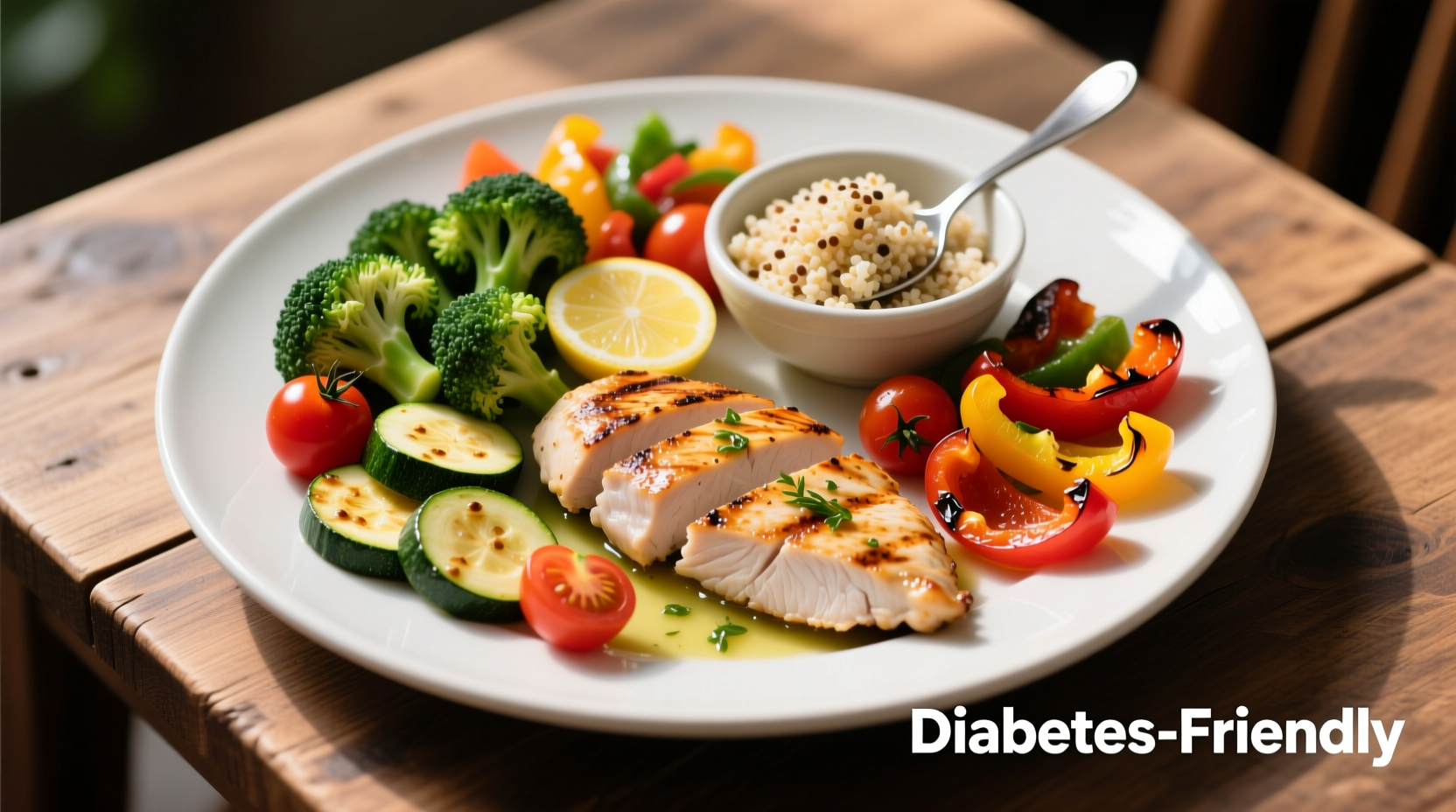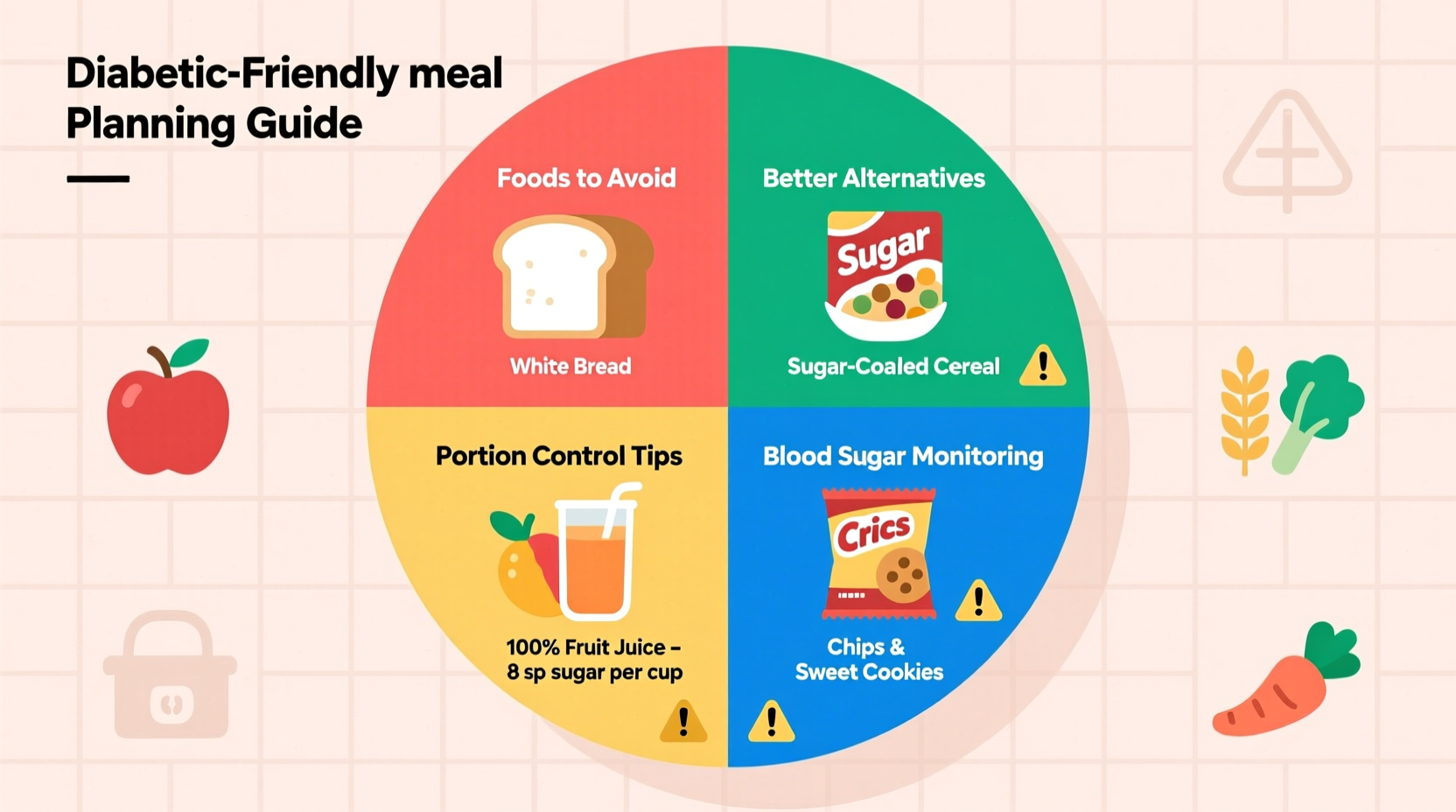Managing diabetes effectively starts with understanding which foods disrupt your blood sugar control. As someone diagnosed with diabetes or supporting a loved one with this condition, you need clear, science-backed guidance on dietary choices that directly impact your health outcomes. This guide delivers precisely that - actionable information from leading medical authorities to help you make informed decisions at every meal.
Why Food Choices Matter for Blood Sugar Control
When you have diabetes, your body struggles to process carbohydrates properly. Certain foods convert quickly to glucose, overwhelming your system and causing dangerous blood sugar spikes. The glycemic index (GI) measures how rapidly foods raise blood glucose levels. High-GI foods (70+) should be minimized, while medium (56-69) and low (55-) options form the foundation of diabetes-friendly eating.
| Food Category | Glycemic Index | Recommended Serving | Health Impact |
|---|---|---|---|
| Soda (12oz) | 63 | Avoid completely | Rapid blood sugar spike, no nutritional value |
| White bread (1 slice) | 75 | Limited to 1/2 slice | Converts quickly to sugar, minimal fiber |
| French fries (medium) | 75 | Avoid or occasional small portion | High in unhealthy fats, promotes insulin resistance |
| Watermelon (1 cup) | 76 | Small portion (1/2 cup) | Natural sugars cause rapid glucose increase |
| Steel-cut oats (1/2 cup) | 42 | Recommended serving | Slow digestion, high fiber, sustained energy |
This comparison, based on National Institute of Diabetes and Digestive and Kidney Diseases research, shows why understanding food properties matters more than simply counting carbs. The preparation method and accompanying foods significantly impact how your body processes carbohydrates.
Foods That Require Strict Limitation
Sugary Beverages and Drinks
Soda, fruit juices, sweetened teas, and energy drinks deliver sugar without nutritional benefits. A single 12-ounce soda contains about 40 grams of sugar - equivalent to 10 teaspoons. The CDC confirms that eliminating these beverages reduces HbA1c levels by 0.5-1.0% within three months. Even "healthy" options like smoothies often contain excessive natural sugars that impact blood glucose similarly to processed sugars.
Refined Grain Products
White bread, pasta, rice, and baked goods made with refined flour convert rapidly to glucose. These foods lack the fiber that slows sugar absorption. Research from the American Diabetes Association shows that replacing just half your refined grains with whole grains reduces post-meal blood sugar spikes by 20-30%. The difference between white and whole wheat bread isn't just nutritional - it's reflected directly in your glucose monitor readings.
Processed Snack Foods
Chips, crackers, and packaged snacks combine refined carbohydrates with unhealthy fats. These "double threat" foods promote both blood sugar spikes and insulin resistance. A 2023 National Institutes of Health study found that people with diabetes who consumed processed snacks daily had 45% higher risk of cardiovascular complications compared to those limiting these foods to once weekly.
High-Sugar Fruits and Dried Varieties
While fruit provides valuable nutrients, certain varieties require portion control. Watermelon, pineapple, and dried fruits like raisins contain concentrated sugars. Dried fruit loses water content but retains all sugars, making a small handful equivalent to multiple servings of fresh fruit. The Mayo Clinic recommends pairing higher-GI fruits with protein or healthy fats to moderate blood sugar impact.
Fried and High-Fat Foods
Fried foods and those high in saturated fats contribute to insulin resistance. When you consume fried items, the combination of high carbohydrates and unhealthy fats creates a perfect storm for blood sugar dysregulation. The American Diabetes Association emphasizes that how you prepare food matters as much as what you eat - baking, steaming, or grilling preserves nutritional value while minimizing negative metabolic effects.

Contextual Considerations for Different Diabetes Types
Understanding the distinction between Type 1 and Type 2 diabetes is crucial for proper dietary management. While both require careful carbohydrate monitoring, the underlying mechanisms differ significantly:
- Type 1 diabetes: Requires precise carbohydrate counting to match insulin doses. Small variations in food intake necessitate corresponding insulin adjustments.
- Type 2 diabetes: Focuses more on improving insulin sensitivity through dietary patterns that minimize blood sugar spikes and support weight management.
Individual responses to foods vary based on genetics, medication regimen, and overall health status. Continuous glucose monitoring reveals that some people experience significant blood sugar reactions to foods others tolerate well. This personalized response underscores why working with a registered dietitian specializing in diabetes care delivers better outcomes than following generic guidelines.
Practical Alternatives for Everyday Eating
Eliminating problematic foods doesn't mean sacrificing flavor or satisfaction. Strategic substitutions maintain meal enjoyment while supporting blood sugar control:
Beverage Swaps
- Replace soda with sparkling water infused with citrus slices
- Choose unsweetened herbal teas instead of sweetened iced teas
- Opt for whole fruit instead of juice to benefit from fiber's slowing effect
Smart Carbohydrate Choices
- Substitute white rice with cauliflower rice or quinoa
- Use lettuce wraps instead of tortillas for tacos and sandwiches
- Choose steel-cut oats over instant varieties for slower digestion
Healthy Snacking Strategies
- Pair apple slices with almond butter for balanced nutrition
- Keep hard-boiled eggs ready for quick protein-rich snacks
- Prepare vegetable sticks with hummus for satisfying crunch
Building Sustainable Eating Habits
Successful diabetes management isn't about perfection but consistent pattern recognition. Implement these practical strategies:
- Read labels carefully: Look beyond sugar content to total carbohydrates and fiber amounts
- Practice portion control: Use smaller plates and measure servings until you develop visual estimation skills
- Time carbohydrate intake: Distribute carb-containing foods throughout the day rather than consuming large amounts at once
- Combine macronutrients: Always pair carbohydrates with protein and healthy fats to moderate blood sugar response
Remember that cultural and personal food preferences matter in creating sustainable changes. The Mediterranean diet pattern, rich in vegetables, whole grains, and healthy fats, consistently shows positive outcomes for people with diabetes across diverse populations. Finding ways to adapt traditional dishes using diabetes-friendly ingredients preserves cultural connections while supporting health goals.
Frequently Asked Questions
Can people with diabetes ever eat sugar?
People with diabetes can include small amounts of sugar in their diet when carefully planned as part of their overall carbohydrate budget. The key is understanding portion sizes and timing - consuming sugar with protein and fat slows absorption. Work with your healthcare provider to determine appropriate amounts based on your individual medication regimen and blood sugar control goals.
Are artificial sweeteners safe for diabetics?
Most FDA-approved artificial sweeteners are considered safe for people with diabetes as they don't raise blood sugar. However, research shows some sweeteners may affect gut microbiome and potentially influence insulin sensitivity. The American Diabetes Association recommends moderation, noting that whole foods should form the foundation of your diet rather than artificially sweetened products.
How quickly do blood sugar levels rise after eating problematic foods?
Blood sugar typically begins rising 15-30 minutes after eating, peaking at 1-2 hours for most carbohydrates. Sugary beverages and refined grains cause the most rapid spikes, with blood glucose reaching peak levels within 30-60 minutes. Continuous glucose monitoring studies show that fried foods combined with carbohydrates can prolong elevated blood sugar for 3-4 hours due to slowed digestion from high fat content.
Do all fruits affect blood sugar equally?
No, fruits vary significantly in their impact on blood sugar. Berries, apples, and pears generally have lower glycemic impact than tropical fruits like pineapple and watermelon. The fiber content, ripeness, and whether the fruit is consumed whole or processed all affect blood sugar response. Pairing fruit with protein or fat slows sugar absorption - for example, eating an apple with a small handful of almonds produces a more gradual blood sugar rise than the apple alone.











 浙公网安备
33010002000092号
浙公网安备
33010002000092号 浙B2-20120091-4
浙B2-20120091-4